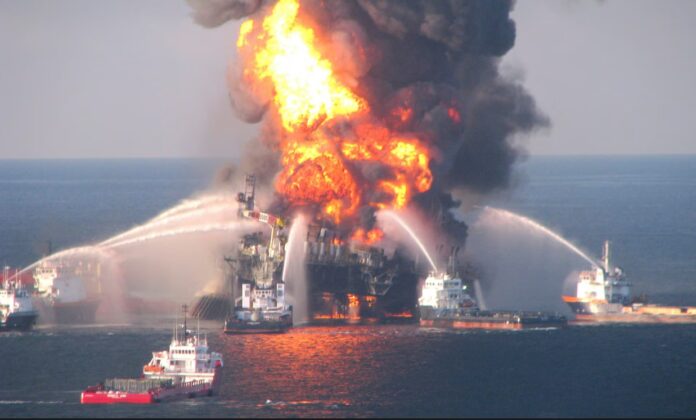The 2010 Deepwater Horizon disaster, dramatized in the 2016 film Deepwater Horizon, remains one of the most significant industrial tragedies in recent history. The disaster struck on April 20, 2010, when an offshore drilling rig operated by BP in the Gulf of Mexico suffered a catastrophic blowout, leading to an explosion that killed 11 crew members, injured dozens more, and triggered one of the largest oil spills in history.
At the heart of this tragedy lies a sobering lesson: when companies cut corners on safety protocols and best practices, the human and environmental costs can be immeasurable. The incident on Deepwater Horizon serves as a grim reminder of the consequences when safety and procedure are sacrificed for cost-cutting. The lessons learned from this disaster are particularly crucial for Guyana, a rapidly growing oil-producing nation.
The Importance of Vigilance and Reporting
One of the primary lessons from Deepwater Horizon is the importance of vigilance. Early signs of trouble were reportedly overlooked or minimized, contributing to the disaster. In Guyana, offshore oil exploration and production have become the backbone of the nation’s economy, providing jobs, boosting local investment, and elevating the country’s global economic standing. Thus, maintaining strict safety and environmental standards is not optional; it’s imperative.
It is essential to encourage oil and gas workers to report any safety concerns, no matter how minor they may appear. Fostering a culture of transparency and accountability can prevent a single oversight from escalating into a full-scale disaster.
Adhering to Standard Protocols and Procedures
In the Deepwater Horizon incident, deviations from established procedures played a central role. Shortcuts were taken to save time and money, ultimately leading to tragic results. For Guyana, which is still establishing itself in the oil industry, there’s an opportunity to put stringent safeguards in place. By adhering to well-documented protocols and industry best practices, companies operating in Guyana can significantly reduce the likelihood of a similar catastrophe.
Professionalism and Responsibility
In high-stakes industries like oil production, professionalism and responsibility must be at the forefront. Workers and managers alike need to understand that their commitment to safety can be the difference between business as usual and a large-scale disaster. Instilling this mindset across all levels of Guyana’s oil and gas industry will ensure that each individual feels responsible for maintaining safe operations.
Environmental and Economic Consequences
The Deepwater Horizon spill unleashed millions of barrels of oil into the Gulf of Mexico, wreaking havoc on marine life, fisheries, and coastal economies. Guyana’s rich biodiversity coastal ecosystem would be extremely vulnerable in the event of a similar spill. Protecting these ecosystems is not only an environmental concern, but also a crucial economic one, as local fisheries and tourism are heavily reliant on the coastal environment’s health.
Building a Safer Oil Industry in Guyana
Guyana has the opportunity to avoid the mistakes that led to the Deepwater Horizon disaster by making safety, vigilance, and accountability the cornerstones of its oil industry. Training programs that emphasize protocol adherence, rigorous inspections, and a culture where workers feel empowered to voice concerns without fear of retaliation can collectively build a safer, more resilient oil sector.
As Guyana continues to grow its oil industry, the lessons from Deepwater Horizon provide a valuable roadmap. By prioritizing safety and ethical standards, Guyana can continue to develop its offshore oil resources responsibly, ensuring its people’s well-being, economy, and environment.
Here is a list of critical questions to be asked of the government of Guyana and the oil exploration and production companies operating offshore in the event of a disaster similar to Deepwater Horizon:
Environmental and Economic Impact
- How will an offshore oil spill of this magnitude impact Guyana’s economy, especially local fisheries and tourism?
- What impact would such a disaster have on the coastal and marine ecosystems of Guyana and the wider Caribbean?
- How will Guyana manage potential disruptions to its vital export activities and trade relationships as a result of an oil spill?
Preparedness and Response Resources
- What specific resources are in place to initiate an immediate response to an offshore oil spill?
- How long would it take for a full-scale response team to reach the site of a spill of Deepwater Horizon’s magnitude?
- What contingency plans are in place to protect Guyana’s coastal communities, fishing zones, and marine reserves?
- Are there mutual assistance agreements with other nations or organizations to provide emergency support if Guyana’s resources are overwhelmed?
Accountability and Legal Responsibility
- Who will bear the primary financial responsibility for cleanup, legal expenses, and environmental restoration in the event of a spill?
- Will the operators or contractors involved in the incident face legal consequences, and what mechanisms are in place to hold them accountable?
- How will Guyana ensure that any compensation paid for damages reaches affected communities and individuals?
- Are there insurance policies in place, and if so, are they sufficient to cover the costs of a disaster of this scale?
Cross-Border and International Relations
- How will an oil spill affect Guyana’s relationships with neighboring nations impacted by potential pollution in shared waters?
- What role, if any, will regional organizations or international environmental bodies play in the response and recovery process?
- Has the government of Guyana considered setting up a compensation fund for regional partners potentially impacted by an oil spill?
Risk Prevention and Future Safeguards
- What measures are being taken to ensure that oil operators adhere to international best practices for offshore drilling safety?
- How often are emergency response drills conducted, and are these drills independently audited for effectiveness?
- Has the government considered implementing stricter regulations or oversight mechanisms to minimize the risk of an oil disaster?
- Will the government impose any penalties or sanctions on companies that fail to meet safety and environmental standards?
- What role do local communities and environmental organizations play in overseeing and reporting safety practices in the offshore oil industry?
Learning from Past Incidents
- What lessons have Guyana’s oil operators learned from the Deepwater Horizon disaster, and how are they applying those lessons in Guyana’s offshore operations?
- Have companies operating in Guyana made commitments to transparency regarding safety protocols, response plans, and environmental protection standards?
These questions aim to probe the readiness, accountability, and commitment to the safety of both the Guyanese government and the companies involved in offshore oil operations.
Noteworthy. According to a report from Reuters on January 16, 2018, “BP paid around $63.4 billion by the end of September to cover clean-up costs and legal fees linked to the largest environmental disaster in U.S. history, where 11 rig workers were killed.”
References:
- United States Environmental Protection Agency – Deepwater Horizon – BP Gulf of Mexico Oil Spill
- United States Navy – Deepwater Horizon Oil Spill Response
- United States Marine Mamal Commission – Deepwater Horizon Oil Spill in the Gulf of Mexico





